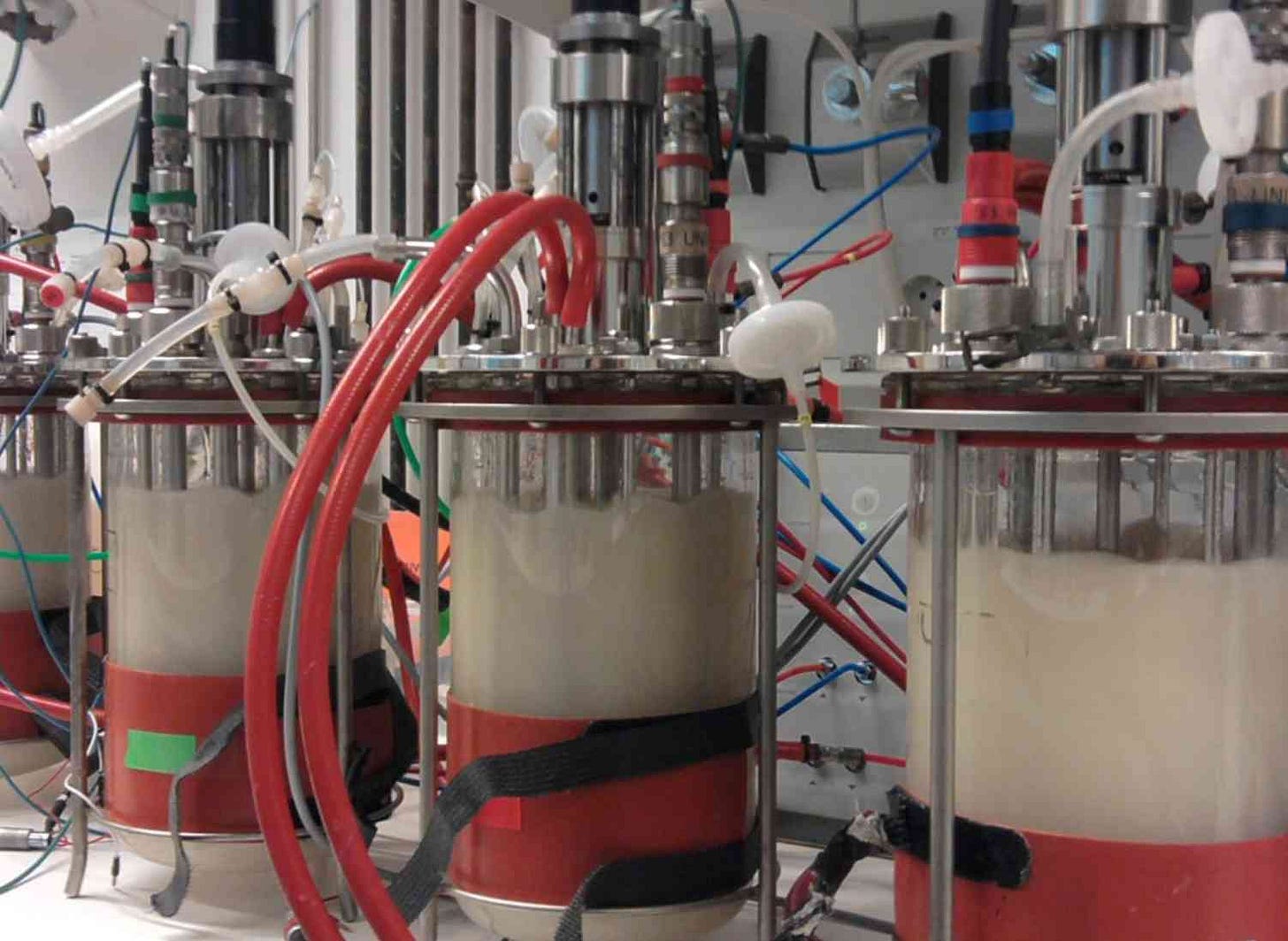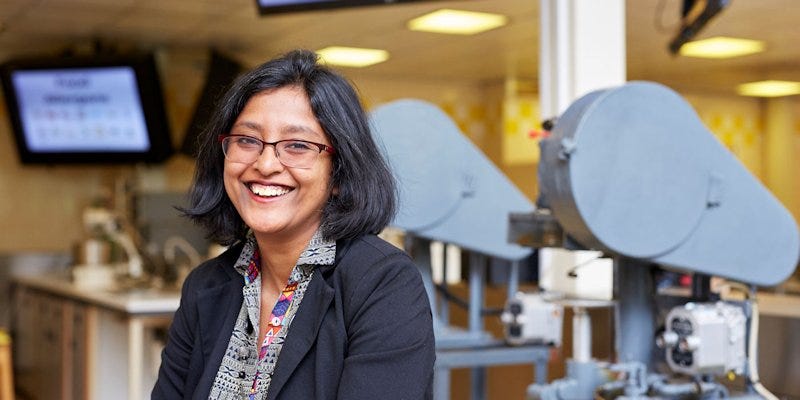India’s Bioeconomy Gets Major Boost, UK Invests £38M in Alt Protein Hub, and $66M JV Deal
Also: Scientists have developed a method to produce alt proteins using wastewater from the food and pharma industries
Hi, happy September!
Welcome to issue #72 of the Better Bioeconomy newsletter. Thanks for being here!
Here’s my favourite quote that I came across while working on this week’s issue:
“Those who deny the benefits of new breeding technologies harm our society.
By obstructing the further development of a sustainable agriculture with:
→ Less fertilizers.
→ Less pesticides.
→ Lower emissions.
Stop fearmongering and let's work together for the future of our planet.”
Let’s dig into the latest developments in biotech, shaping the future of food and agriculture! 🍽
BIO BUZZ
♻️ Scientists have developed a method to produce alt proteins using wastewater from the food and pharma industries
Researchers from the Technical University of Denmark used saline waste from dairy giant Arla's cheese production and Novo Nordisk's nitrogen-rich pharmaceutical residue to achieve efficient yeast growth without needing fresh water or sterilization.
The yeast strain, D. hansenii, thrived in high-salinity environments and was genetically modified using CRISPR to produce valuable proteins for commercial applications.
This method uses the nutrients in waste streams, offering a sustainable solution to food industry byproducts. It reduces environmental impact while creating alt protein sources for meat and dairy analogues.
Source: Green Queen
🥔 PoLoPo to supply patatin, a native potato protein, in response to unexpected demand from clients
The Israeli molecular farming startup is now supplying patatin, a native potato protein, in response to unexpected demand from clients who had already been buying its egg protein, ovalbumin.
The startup uses its SuperAA platform to improve the protein content within potato tubers, making patatin more cost-effective than traditional extraction methods.
PoLoPo’s patatin stands out due to its high protein digestibility score of 0.99 and the presence of all essential amino acids, making it comparable to high-quality proteins like casein, beef, and eggs.
Source: Green Queen
🇨🇳 Angel Yeast, a global leader in yeast manufacturing, initiated a probiotics production project in Xizang
The facility will produce key strains like Lactobacillus plantarum S2, DB-8, and Streptococcus thermophilus, catering to various industries, including food and agriculture.
This marks a milestone in their strategic shift toward biotech. They aim to achieve localized and industrialized production of probiotics while diversifying and expanding their presence in the sector.
In terms of future plans, Angel Yeast wants to expand into new biotech sectors, such as synthetic biology, biocatalysis, biomaterials, and biotech services.
Source: iGrow News
🧬 Ginkgo Bioworks and Vitales, a subsidiary of Uby Agro, partner to develop biocontrol products targeting critical soybean diseases in Brazil
The partnership focuses on combating two significant soybean diseases: Soybean Sudden Death Syndrome (SDS) and target spot. Brazil's fast-growing biocontrol products market now comprises 4.2% of the crop protection market.
Ginkgo Bioworks' extensive strain collection, which has undergone rigorous pre-validation through in vitro and in planta screenings, provides effective biocontrol solutions to Brazilian farmers more quickly.
Ginkgo will also apply its expertise to create various prototype formulations. These include seed treatments and foliar applications designed to meet Brazil's unique agronomic and environmental conditions.
Source: iGrow News
🔬 Neurospora intermedia fungus shows promise for upcycling food by-products into nutritious foods
A UC Berkeley study showed that N. intermedia strains in the traditional Indonesian food oncom belong to a genetically distinct group specialized in breaking down complex polysaccharides like cellulose and pectin.
Solid-state fermentation of by-products with N. intermedia improves the protein and lipid content of the substrate. It also enhances the flavor and nutritional profile by reducing undesirable compounds and increasing beneficial ones like ergothioneine, a potent antioxidant.
The fermented products derived from N. intermedia were positively received by consumers outside of Indonesia, with favorable ratings for flavor, texture, and appearance.
Source: Nature Microbiology
MACRO STUFF
🇮🇳 India's BioE3 policy targets the bioeconomy, focusing on alt proteins among six strategic areas
The BioE3 (Biotechnology for Economy, Employment, and Environment) policy aims to enhance the Indian bioeconomy. This aligns with India's broader goals of achieving net-zero emissions by 2070 and promoting sustainable practices through the Lifestyle for Environment (LiFE) strategy.
Smart protein startups are expected to benefit significantly from increased R&D support, enhanced production capacity, and better market accessibility, which align with the policy's goals.
The country's bioeconomy has experienced rapid expansion, growing from $10 billion in 2014 to over $130 billion in 2024. This growth trajectory is expected to continue, with the sector projected to reach $300 billion by 2030.
Source: Green Queen
🇦🇺🇳🇿 Food Standards Australia New Zealand proposes that foods will only be considered genetically modified if they contain "novel DNA"
This means that even if a food has been processed using new breeding techniques (NBTs) like genome editing, it won't be labelled as GM unless the final product contains new or foreign DNA that wasn't previously part of the species' genetic makeup.
NBTs include genome editing, cisgenesis (using genes from the same species), and intragenesis (using genes from a closely related species). These techniques can produce genetic changes similar to those that occur naturally or through conventional breeding.
FSANZ argues that when these changes do not introduce novel DNA, the resulting foods should not be subject to the same regulations as traditional GM foods. The agency has opened a period for public comment on these proposed changes, with a September 10, 2024 deadline.
Source: FoodNavigator Asia
💸 New GFI report explores financing strategies for alt protein companies beyond VC and addresses key challenges
Companies are struggling to find other funding sources due to a lack of knowledge about available capital pools beyond VC, complex requirements of public capital pools, and high rejection rates from private capital providers.
Various capital pools beyond VC, such as equipment leasing, strategic partnerships, and government programs, are explored as potential funding sources. The emphasis is on creating a diversified funding mix, including long-term debt, government incentives, and blended finance to reduce capital costs.
The report discusses the limited applicability of traditional project finance and long-term offtake agreements in the alt protein industry. While these methods have been successful in other sectors, they are less viable for alt proteins due to market risks and the industry's nascent state.
Source: GFI
BIO BUCKS
🇬🇧 The UK is launching a £38M National Alternative Protein Innovation Centre to promote climate-friendly food alternatives
The University of Leeds is hosting the hub, which focuses on developing plant-based, cultivated, and fermentation-derived products alongside sustainable animal feed.
NAPIC involves collaboration among top universities, businesses, regulators, and international partners like the United Nations to advance alt protein commercialization.
The centre will operate through four pillars: Perform (taste and nutrition), Produce (ingredient development), Process (scaling production), and People (ensuring fair access and support for farmers).
Source: Green Queen
🤝 Zydus Lifesciences acquired a 50% stake in Sterling Biotech from Perfect Day for ₹550 crore ($66M)
This strategic move converts Sterling Biotech into a joint venture (JV) focused on animal-free protein production, combining the expertise of both companies. Zydus’s acquisition comes at a 70% premium over the price Perfect Day paid two years ago when it purchased Sterling Biotech for $78M.
Zydus and Perfect Day plan to set up a dedicated precision fermentation facility as part of the JV. This facility will be designed to cater to the growing global demand for animal-free proteins, particularly for use in the health and nutrition sectors.
This partnership marks Zydus’s entry into the specialized biotech products market, aligning with consumer trends toward animal-free proteins and addressing issues like lactose intolerance.
Source: Green Queen
🇺🇸 The Better Meat Co received $1.48M from the US Department of Defense to scale up its production of mycoprotein
The company makes Rhiza mycoprotein from the fungi Neurospora crassa, using a continuous fermentation process that has improved yields and reduced costs by 30%.
With the funding, the company plans to open a new bioproduction facility and scale up its fermentation capacity from a 9,000-litre to a 150,000-litre vessel.
The funding is part of the DoD’s Distributed Bioindustrial Manufacturing Program, which supports critical supply chains in areas like food and fuel for national defense.
Source: Green Queen
🌭 Zur Mühlen Gruppe, a major German sausage producer, invested in fermentation startup Nosh.bio
Berlin-based Nosh.bio uses fermentation and koji mushrooms to create nutrient-rich proteins for various products, including meat and fish alternatives.
ZMG plans to use koji mushrooms to develop a new range of protein-rich, meat-free products, starting with "koji strips" that can be fried or used in salads.
This move builds on ZMG’s existing efforts in the plant-based market through its brands Gutfried, Vevia 4 You, and Es schmeckt, aiming to leverage its market strength and experience.
Source: vegconomist
PODS & POSTS
💡 Tips for academic scientists to craft standout resumes for biotech startups
Highlight how your specific scientific expertise can solve the startup's core problems. It demonstrates your proactive approach to addressing the company’s needs.
Frame your technical skills with quantifiable achievements that indicate an understanding of the fast-paced, result-driven startup environment rather than just academic accomplishments.
Showcase communication and collaboration abilities through concrete examples of past experiences and emphasize their importance in a multidisciplinary startup setting.
Source: Katie Bashant Day
🤖 Syngenta Group's Chief Information and Digital Officer, Feroz Sheikh, on how Syngenta is thinking about AI
APAC AGRI-FOOD INNOVATION SUMMIT
🤝 Meet 1000+ global leaders who are accelerating climate-adaptation strategies for food security in Asia
Better Bioeconomy is excited to be a media partner for the Asia-Pacific Agri-Food Innovation Summit, taking place at Marina Bay Sands on November 19-21!
As the anchor event of Singapore International Agri-Food Week (SIAW), in collaboration with Temasek, the Singapore Food Agency (SFA), and Enterprise Singapore (ESG), the Asia-Pacific Agri-Food Innovation Summit will bring together over 1000 global leaders to identify the strategic priorities as we build greater capacity, security, and resilience in Asia’s agri-food system.
See you there! 👋🏾
MORE ON BETTER BIOECONOMY
💬 My conversations with bioeconomy innovators
Biotech consultant and ex-CSO of Vow, James Ryall: Bridging Science and Business to Support Startups Using Biomanufacturing
Synonym's co-founder, Joshua Lachter: Financing and Developing Infrastructure for the Bioeconomy
Bioshyft's founder, Gerrit Feuerriegel: Connecting Innovators, Investors, and Incumbents to Drive the Bioeconomy
Terra Bioindustries’s CMO, Rebecca Palmer: Turning Agrifood Byproducts Into Nutrient-Rich B2B Ingredients
That’s a wrap. Thank you for taking the time to read this issue!
Are you new here?
Know anyone else who would dig this newsletter?








Thanks so much for this educational and informative newsletter. Your newsletters are among the very best. You are appreciated 👏